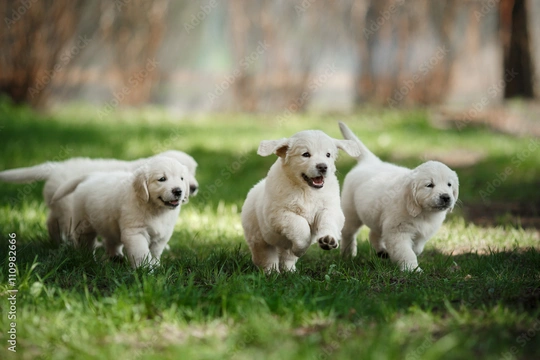
Early puppy socialisation tips for dog breeders
Early puppy socialisation is a gamechanger if you want to raise resilient and confident pups who will grow into well-rounded adult dogs.
According to a study conducted in 2020, more than 70% of dogs display signs of anxiety. The range of common anxiety behaviours include noise sensitivity, generalised fear, impulsivity or lack of attention, compulsive behaviors, aggression, and behaviours relating to separation anxiety.
Through introducing your young puppies to a range of novel sounds, textures, scents, and experiences, you can reduce the likelihood of them experiencing anxiety in later life.
Tip 1: Don’t push too hard
Socialisation is important but pushing a puppy to experience something which provokes signs of fear will be detrimental to their confidence building.
If a puppy seems fearful or worried or chooses not to engage in an activity then take a step back. Give them space and time and allow them to try again at another time. Preferably after they have had a sleep! Puppies process new learning when they sleep, so a nap can give them the confidence to be bolder next time!
Tip 2: Introduce your puppies to normal household items
You don’t need to spend lots of money on flash toys and equipment to socialise your puppies. Think of the things they’ll experience in normal daily life such as a mop moving along the floor nearby, the sound of the hoover, and pans clanging in the kitchen. Even ringing the doorbell a few times a day or playing some fireworks sounds on YouTube are easy and effective early socialisation exercises you can try.
Through gentle introduction to the movement, scents, and sounds of these things, your puppies will learn they’re no big deal.
Tip 3: Socialising your puppies to humans
Without overwhelming the puppies, make a point of introducing your litter to as many different people as you can. Adults, children, teenagers, male and female, it is vital that puppies are confident around humans. Remember clothing and accessories changes the visual picture for puppies, so add hats, scarves, different footwear, umbrellas and walking sticks, to extend the experience once the puppies grow more confident.
Tip 4: Get your puppies used to the outside world
While your puppies can’t go out and about, you can still socialise them to feel comfortable in the outside world. Time spent outside in your garden will expose them to new scents, sounds, and textures beneath their feet.
You can also bring home items from your walks or from friends’ homes to introduce new scents to your litter.
Tip 5: Introduce your puppies to car travel
The first journey to your puppies new home shouldn’t be the first time they spend in a vehicle. Puppies that struggle with travel can have limited life experiences with their new owners. So take it slowly, first introducing them to being in the car with the engine running, then by taking them for a very short drive, 5 minutes max. Gradually build the length of time in the car, day by day, until they are happy to travel. You can extend this by adding in the radio and open windows, as and when you feel the puppies are ready.
Tip 6: Offer different surfaces for your puppies to explore
Giving your puppies the opportunity to explore different feelings beneath their feet is a great way to build confidence.
From laying down crunchy bags to cushions and cardboard boxes, all these textures provide novel feelings for your young pups. You can use a plastic step or a small ballpit to give your pups the chance to experience new things. Get creative, once you start looking around your home you’ll find plenty of bits you can put to good use.
Tip 7: Socialising your puppies to being handled
Your puppies will need to be handled in ways that go beyond a little stroke on the top of their heads! From vets to groomers, puppies will need to be touched in places that they’re not used to.
By spending a few minutes each day getting them used to physical touch on their paws, gums, tummies, and all over, you will set them up to feel much more comfortable and confident when they see the vet or groomer.
Learn more about preparing your puppies for formal handling and grooming here.
This article is a guest post kindly contributed by Rebecca Walters of Pupstarts Breeders. Pupstarts provide dog breeding courses to help ethical dog breeders to breed, whelp and raise puppies responsibly, safely and with absolute confidence.
Take a look at their Level 2 course in the Principles of Puppy Socialisation here.



